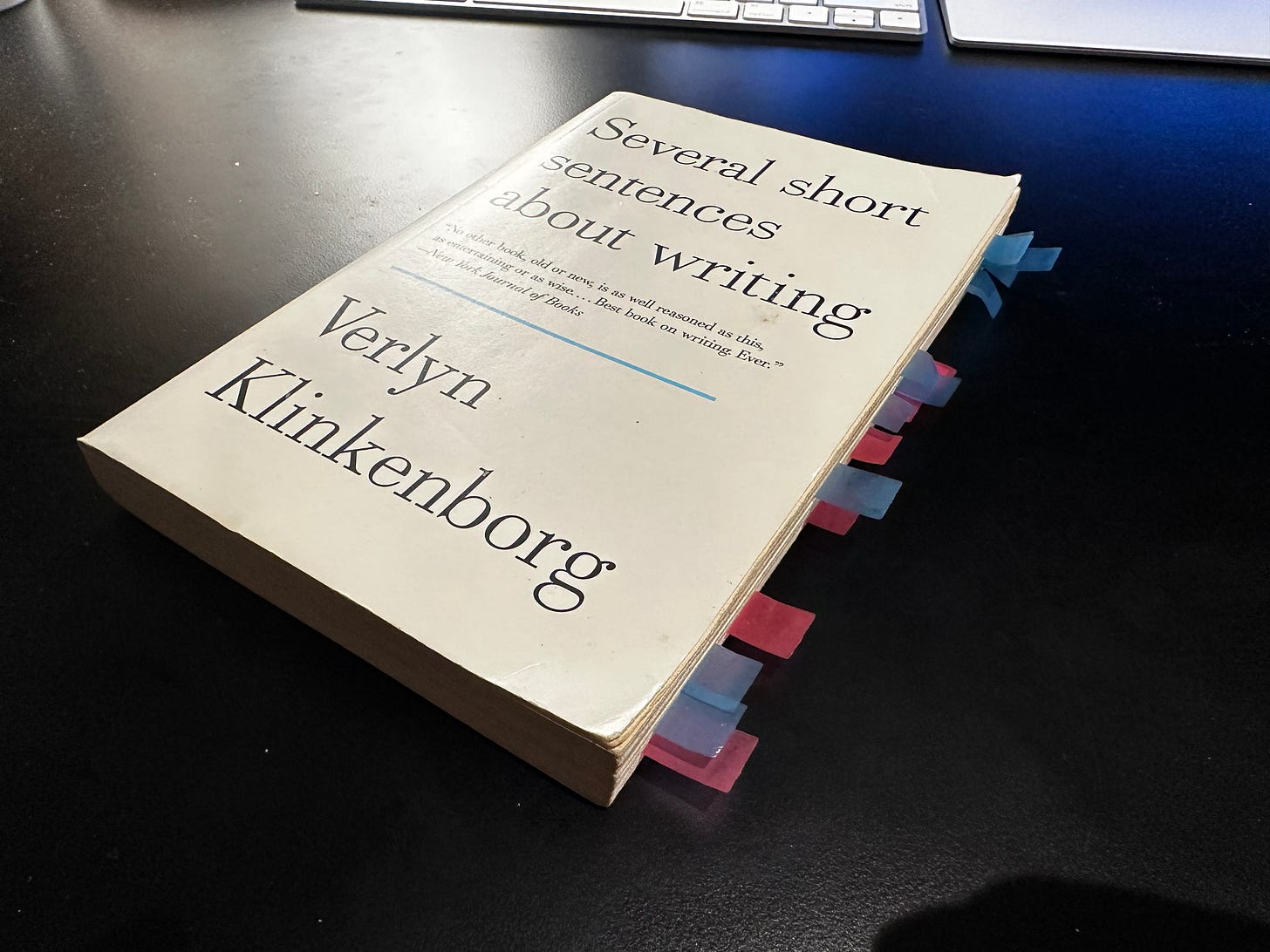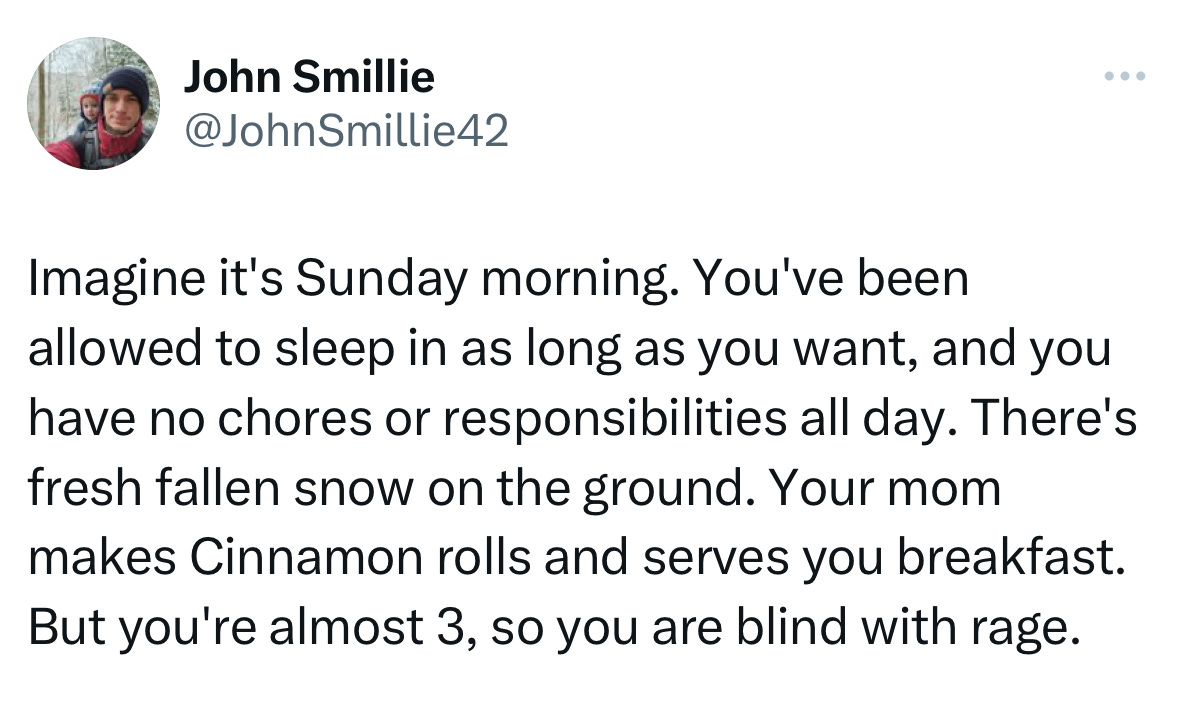One Piece of Advice I Give To All New Dads
"Noticing means thinking with all your senses. It requires a suspension of yearning."
One of the email archetypes that regularly hits my inbox is “I’ve got a kid on the way, do you have any advice?” After I nudge them in the direction of TedOS, there’s an old essay from the site I tend to send.
It was published in 2022 and came Daniel Pink-approved: “Parenting advice I wish someone had given me two decades ago as a young father.” Many dads have contacted me since, thanking me for the suggestion.
There were only 3,000 of you here back then. There are 17,000 of us now. Today felt as good a time as ever to rerun it. (It’s also one of my favourite illustrations Tony ever did, so double the reason to dust it off.)

I’m occasionally asked, “What’s one piece of advice you would give new parents?”
It’s an easy answer. The same nugget I wish I’d been given ten years ago: “Buy a small notebook, keep it handy, and write down things you notice.” It doesn’t need to be every day, once a week, or with any kind of regular cadence. Simply start scratching in pencil the things that itch your brain. They may be significant milestones, but they’ll just as easily be minor, almost imperceptible, events that you alone observed. Another wonderful side effect of this habit? As they grow older, you’ll end up with a book filled with almost-forgotten memories, and hilarious things your little ones say. “Future you” will thank “today you” for capturing them: fleeting moments, forever enshrined.
I didn’t do it. I wish I had. I got there eventually, I suppose. Three years spent here, standing at the keyboard, sending thoughts and feelings on fatherhood to anyone who’ll read them. There are times when it comes easy. There are times when it does not. But a weekly deadline has been a powerful motivator. One major realisation over these years is that I’d still be doing this even if no one read it. The act of organising disparate thoughts into essays helps me be more intentional about the parent I want to be, and working my shit out in public means I don’t end up taking it out on the people I love the most. It’s like Frank Ocean confessing to his mother on the final track of Blonde:
Play these songs, it's therapy, mama
They paying me, mama
I should be paying them
I should be paying y'all, honest to God”
I worked in advertising for a while, but my role has always was—in a gross oversimplification—a thinker, not a doer. I was a “strategist.” I helped doers do better work. I lacked what the creative industry calls the “craft skills” necessary to make a great work myself. But, on starting this newsletter, it soon dawned on me that I had gifted myself a prime opportunity to close what Ira Glass called “The Gap:”
(If you haven’t seen this, go watch it. 2 minutes well spent. It’s fine! I’ll wait here.)
Everybody I know who does interesting, creative work, they went through years where they had really good taste and they could tell that what they were making wasn't as good as they wanted it to be. They knew it fell short. Everybody goes through that.
The most important thing you can do is do a lot of work. Do a huge volume of work. Put yourself on a deadline so that every week or every month you know you're going to finish one story. It is only by going through a volume of work that you're going to catch up and close that gap, and the work you're making will be as good as your ambitions.
The first year of this newsletter was spent focusing on the craft. I wrote a lot. I also read a fair bit: books from comedians, philosophers, and poets; books about fishermen, wannabe chefs and psychedelic explorers; books with personal stories regaled with vivid prose and deep vulnerability. And I read books that taught me how to write.
One book that continued to work its way deeper inside my brain as I slowly savoured every page and paragraph—methodically tagging favourite passages with neon pink and blue stickies, pencil notes forged in margins like I am 17 and back in English Literature class once again—was Several Short Sentences About Writing by Verlyn Klinkenborg. An author, academic and former editor of The New York Times, he wrote in praise of paying attention, and understanding that "everything you notice is important.”
“Noticing means thinking with all your senses.
it requires a suspension of yearning
And a pause in the desire of pouring something out of yourself.
Noticing is about letting yourself out into the world,
rather than siphoning it into you
In order to transmute it into words.”
This book permitted me to slow down, to give thoughts the time and space required to transmute themselves into meaning and insight, and to get words down on paper habitually (at long last). It’s a book that reprogrammed how my mind operates on the fly, changing the way I perceive the world and the interactions I make as I move through it.
It has, without question, made me a better writer. But becoming a better dad was an unintended side effect. Because your ability to notice is impaired if you’re mentally somewhere else—body at home but mind at work. My commitment to a weekly newsletter has rewarded my ability to notice the connective tissue of family life, and the momentary moments of joy that would otherwise go unnoticed.
Our days raising children are filled with countless curiosities to be followed, and the rewards are vast. As Klinkenborg says—and Tony beautifully illustrated up top:
“It’s catching your sleeve on the thorn of the thing you notice,
And paying attention as you free yourself.“
3 things to read this week
“Is Sleep Training Harmful?” by Tom Valliant in The Pudding. One consistent truth about raising a baby is no matter what you choose to do, there will be thousands of people on the internet telling you you’re doing it wrong. Sleep training is one such topic, and Valliant has done great work here in combing through Reddit threads, news articles, books, peer-reviewed studies and more, presenting it in the same engaging and interactive manner that The Pudding has gained its sterling reputation for.
“How to Tell Your Kid That You're a Drunk” by Ben Gaffaney in The Small Bow. You might recall AJ’s essay here earlier in the year, and The Small Bow continues to be one of the internet’s best “accidental fatherhood newsletters.” This guest post dives into writer Gaffaney’s battle with alcoholism, navigating life as an Adult Child of an Alcoholic, and how he is approaching discussing with his son the alcoholic tendencies that runs through his side of the family. “We could read my imaginary book, AA Junior., with Bill W. as a friendly walrus who explains, ‘Some people who drink too much think they can drink just a little and be happy. But they’re wrong, and that’s okay.’”
“Why Irish Names are Tongue-Twisters for English Speakers” by Séamas O’Reilly in The Guardian. O’Reilly’s weekly fatherhood columns in The Guardian are always great bang for your buck, but this one about hard-to-pronounce Irish names was particularly on the money.
Good Dadvice
Happy October! Let’s talk about the Therapy Fund
Next Thursday is World Mental Health Day. As always, we’ll be discussing paternal mental health throughout October. Next week I’ll hand the newsletter over to a dad with a powerful story to tell about navigating trauma and his own mental health battles, and the role psychedelics and therapy played in his recovery.
Not every dad who struggles with their mental health needs to see a therapist. But too many dads who need to see a therapist can’t. This week marks the start of Year Three of running the Therapy Fund, our community-funded initiative to enable dads to get access to therapy when and where they need it: regardless of where they live, how much money they make, or what insurance plan they’re on.
Throughout the year, 10% of every TNF subscription goes into the fund. But this month, as with every October, 100% of all subscription fees for the newsletter will go towards helping dads get access to therapy. Over the last two years, we’ve been able to help 12 dads. Here are some words from a few of them:
The therapist you matched me with has been great! We met several times and after our last meeting we agreed that I probably had the tools to go forward without meeting regularly. He was kind enough to make himself available if anything came up. I really do think it’s been helpful in getting me past what was going on. And thank you very much to you and your readers that make this available to dads like me.
I am so grateful to the New Fatherhood community for this initiative. I was struggling with anxiety as a father of two, and Kevin sourced a great therapist for me that offered a safe space for healing without the stress of additional financial pressure. I would encourage any dad who is struggling with mental health issues to get in touch.
As a dad who found himself struggling with a horrendous situation, the therapy I received enabled me to take a step back from problems and give some time to myself. To be able to talk openly to a professional about my feelings, issues and current difficulties helped relieve some of the pressure I am under and allowed me to understand why I’m feeling how I am, and what steps I can take to help myself. It’s a massive weight off my shoulders sharing my experiences which ultimately helps me be the best dad I can be.
If you’re a dad reading this and feel like you’d benefit from therapy but it seems out of reach financially—please get in touch. If you want to know more about how the fund works, read last year’s report.
And if you want to support this essential work, please sign up for an annual subscription or directly donate with these links:
One hour of therapy | Five sessions for one dad
Thank you!
Say Hello
How did you like this week’s issue? Your feedback helps me make this great.
Loved | Great | OK | Meh | Bad
Branding by Selman Design. Illustration by Tony Johnson. Survey by Sprig.







The piece of advice I give all new dads, based on the need to avoid back pain and to let your kid cry from time to time, is strengthen your core and harden your heart.
But the notebook's a good idea too.
100%. Getting familiar with mindful observation is maybe the only grounding technique that has worked for me—and that’s before somatic therapy approaches showed up and massively supported that with anecdotes, research, and more methods and resources than you can actually use. I came to a phenomenological observation practice through teacher-training PD; I don’t practice every day, but when I do, the beneficial effects last through the hard times.
Having Humanities degrees (especially in language and literature) has also come in handy in identifying patterns in thoughts and words and interpreting the chaotic pastiche of consciousness and reality. Glad there’s finally a payoff!